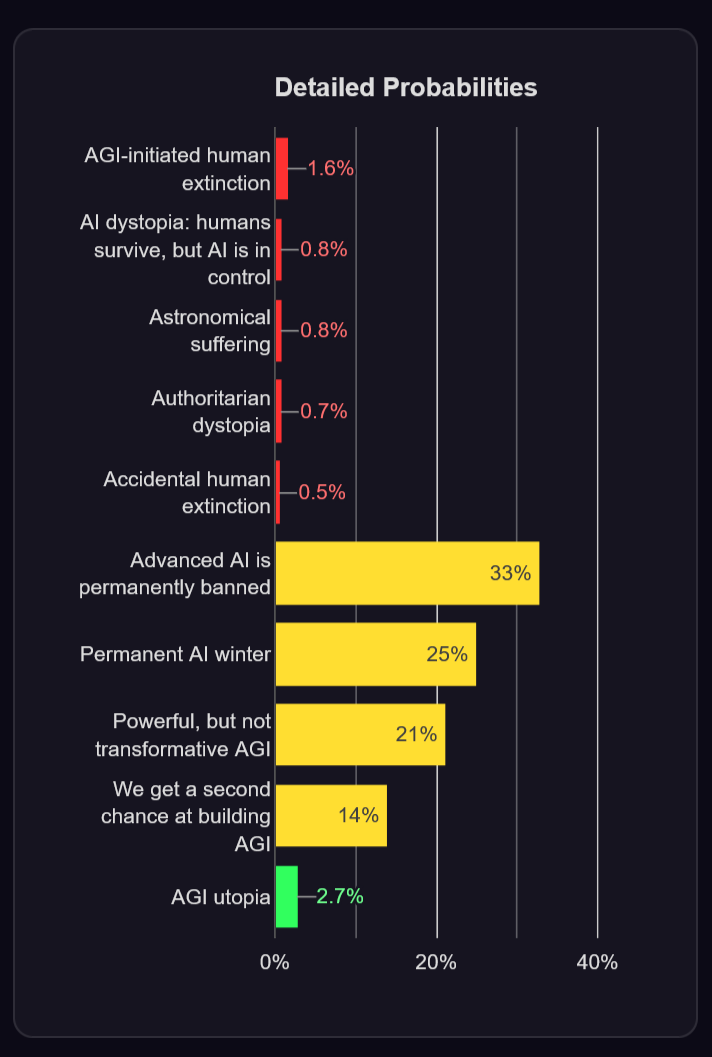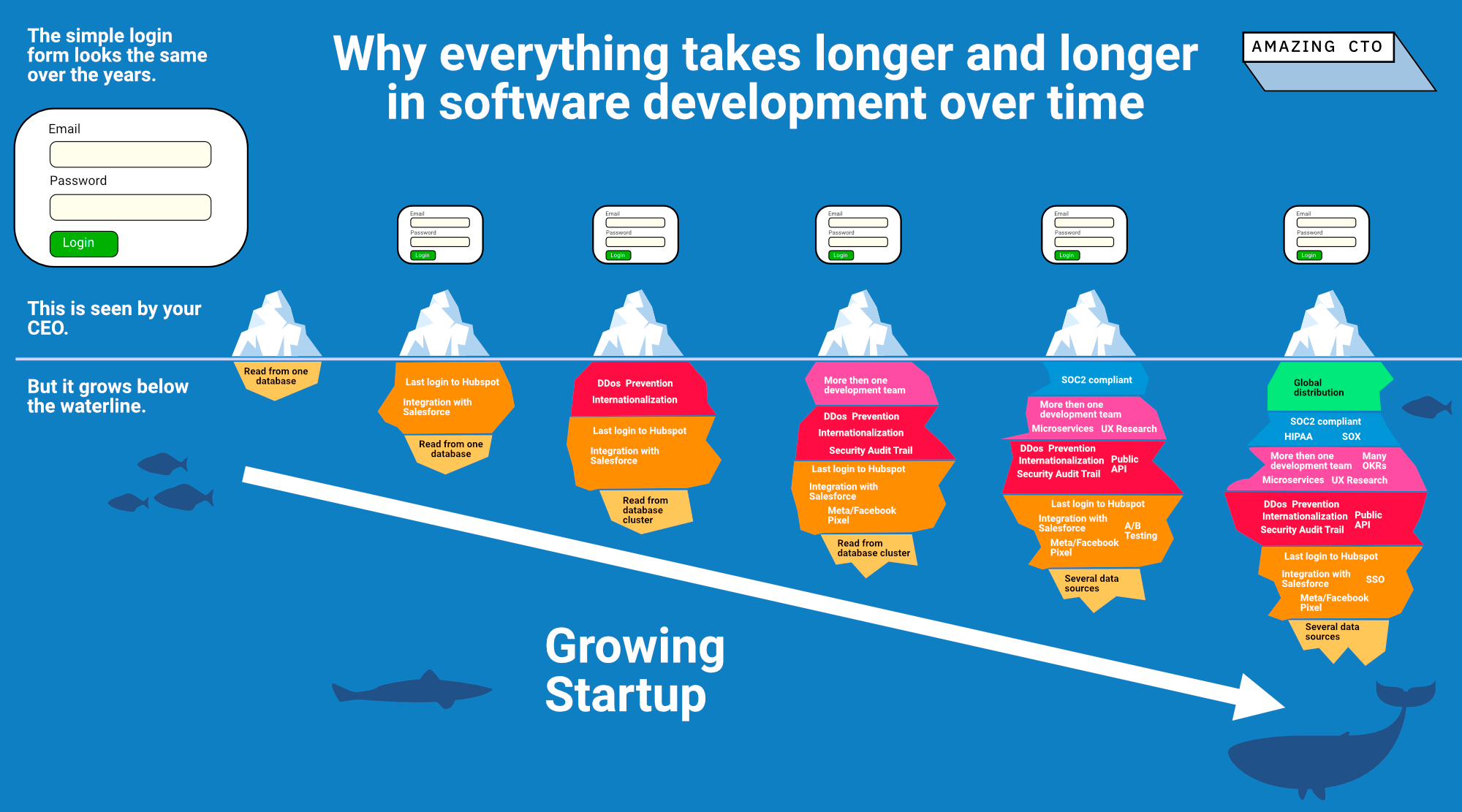If you only read one thingMap of AI Futures (5-500 minute read)
A very interesting approach to map the future of AIs outcomes. Add a probability to decisions on the way, and see where we land. Results mostly not cool, I can tell you that, though probabilites need to be adjusted, depending on your optimism. (still optimistic!, But I guess Skynet is optimistic too). This is only one reason I put the article here. The other: This could be a very cool tool to predict your tech future and where you end. Want to see if your strategy works? (say 90% your new database has the intended performance, 10% it doesn’t and so on). Turn it into this kind of maps and see the probability for different outcomes, what a tool Show off to the board and c-suite and look like a magician! Brilliant I might say. https://swantescholz.github.io/aifutures/v4/v4.html
Stories I’ve enjoyed this weekSoftware Engineer Titles Have (Almost) Lost All Their Meaning (10 minute read) Have titles deteriorated? The article is a big shout-out to senior developers: “The “senior” title, once a badge of substantial experience and expertise, has been particularly devalued.” Personally I would agree. But hasn’t it already been bad for a long time? When I ask CTOs what a senior means, they often say coding experience in one language. For me, senior is a broad set of skills, binary ones, not “longer experience.” Being able to direct others, being able to make long-term architecture decisions, being able to make tech/business trade-offs. Too often I see this “5 years of Javascript experience” to become a senior. Perhaps this is easiest for recruiting by HR departments. “The fierce competition for talent has led companies, especially startups, to use titles as a retention tactic. “ Also this. Your recruiting works, so couldn’t you care less? No. Your problems don’t stop with recruiting seniors, but promoting them. If the senior role is unclear, everyone wants to be promoted. With 5 clear characteristics (or 4 or 6), which are binary, and not “5 years of experience,” it’s clear in for everyone what it takes to be promoted. With stronger fences around the senior title, it’s easier to promote. Also don’t have architects. https://www.trevorlasn.com/blog/software-engineer-titles-have-almost-lost-all-their-meaning Accountability sinks (4 minute read) Not “accountability sinks.” It’s not sinking. But an accountability “sink.” Like in “organizations form “accountability sinks,” structures that absorb or obscure the consequences of a decision such that no one can be held directly accountable for it.” Do you have these? I’ve seen this many times. In one company, dozens of people were put into emails (in TO: & CC: — and in BCC: for politics) to spread responsibility. Just from looking at one email, you could deduct the company culture of non-accountability. Also meeting where everyone an the kitchen sink (ha!) was invited to. I once set a day in meetings next to the same person. Ad-hoc accountability sinks. https://aworkinglibrary.com/writing/accountability-sinks Engineering velocity (4 minute read) “Always the dollars. Always the f’ dollars.”* Nicky Santoro - Casino. “Always velocity. Always the f’ velocity.”* Stephan Schmidt, CTO Newsletter. Some ideas on why teams get slower in growing companies. That’s a fact. And you’d better prepare your CEO to reality (not that you shouldn’t do everything to make development as frictionless as possible). I wrote a more thorough article with "⌚ Why Everything Takes Longer and Longer in Growing Startups” because many of my CTO clients (and CEOs!) are surprised. And hiring doesn’t help (for mathematical reasons, /DM me if you want to know).
https://another.rodeo/engineering-velocity/ Learn more about A/A Testing (4 minute read) A/B tests are a sign that the company has no vision and no strategy. A/B testing is for cash cow features, late in the cycle. If your org does too many A/B tests, and you have the feeling they don’t know what they do (no fundamentals in hypothesis testing), try A/A tests “The primary goal of an A/A test is to ensure that the testing infrastructure, such as cohort assignment and data collection methods, works properly before proceeding with an A/B test.” Show everyone that sometimes A is better than A. https://www.votito.com/methods/aa-test/ Go Plan9 Memo, Speeding Up Calculations 450% (7 minute read) Using SIMD in Go. SIMD are parallel computations and can speed up computations or data transformations tremendously. Not officially supported in Go, but there is support in other languages like Java and Rust. I do feel we’re behind using SIMD as CTOs, knowing about SIMD is something I consider important for engineering managers today, and is currently undervalued. https://pehringer.info/go_plan9_memo.html Why Does Everyone Run Ancient Postgres Versions? (25 minute read) You NEED to not fall two versions behind with databases - when running databases on your own or when your managed version doesn’t auto-upgrade. I have seen CTO clients of mine who fall behind two major versions, and when something happens, they are in deep trouble. Perhaps the version is no longer supported, or there is a critical security bug that is not fixed in your version. Then you’re in deep trouble. There are lots of different ways for technical debt - being behind with your database version is one. When a new version is released, plan for a migration immediately. Don’t bow to business pressure. Run tests for the upgrade, then plan the upgrade (plan a fallback procedure). The last possible point to upgrade is when another (next) new version is released. (the same goes for major framework upgrades, etc.) https://neon.tech/blog/why-does-everyone-run-ancient-postgres-versions Maximising GitHub Actions Efficiency: Building the Ultimate Runner Box (26 minute read) First call me ignorant-I didn’t know I can run GitHub actions on my local box. So I can. Second, CI/CD should be a help, as fast as possible and not creating friction for developers (remove everything that creates friction!). Their investment was very low, for a high gain in CI/CD throughput. With fiber everywhere, you can run your local box in your office (still have one?)—I’d use GitHub cloud as a backup though. I was surprised that their 14900k outperformed a Threadripper in compilation speeds - I do guess it depends on how many cores your CI/CD pipeline can utilize. Your compiler might be great at that, all linters etc. may be bad. https://words.strongcompute.com/p/maximising-github-actions-efficiency Marissa Mayer: I Am Not a Feminist. I Am Not Neurodivergent. I Am a Software Girl (32 minute read) “I’ve always been a software girl.” And I’m a coder at heart. “n that moment, passion is a gender-neutralizing force.” I do think we need more things that bring us together. Beside this nugget there are more nuggets in that article, on especially about decisions, you need to find and read. MUST. https://www.wired.com/story/big-interview-marissa-mayer-yahoo-sunshine-ai/ How to Rock Your Annual Planning to Come Out Ahead Instead of Exhausted (18 minute read) “Everybody likes to hate on waterfall processes.” I more and more love waterfall, but that’s for a different newsletter. I don’t like annual planning. If you need to do it, and I did in the past, the article has some good points. Though again the article assumes Product is in control, you the CTO are! Don’t let anyone tell you otherwise. Personally I like quarter like planning. You have a vision (where you want to be, golden future), break it down in a strategy (how to get there, what steps do I need to take, what do I need to have), from the strategy have quarterly objectives (OKR), then create sprints from the objectives. Done. This is interleaved for business, product and tech. https://www.news.aakashg.com/p/how-to-rock-your-annual-planning Join the CTO newsletter! | |

 Source: swantescholz.github.io/aifutures
Source: swantescholz.github.io/aifutures